Condition: Psoriasis
Alternative names: [Chronic plaque, guttate, nummular/discoid, palmoplantar pustular, pustular, annular pustular, generalized pustular] – psoriasis, seborrhoeic dermatitis, sebopsoriasis.
If Psoriasis is affecting your life, then the Harley Street Dermatology Clinic is here to help. Our consultant dermatologists can offer you expert treatment with a very good chance of dramatically improving your psoriasis.
WHAT IS PSORIASIS?
Psoriasis is an inflammatory skin condition that causes thickening, redness and scaling. It can affect the whole of the skin including the scalp and nails. Occasional it can be associated with arthritis. It tends to be intermittent in nature and is characterized by remission and ‘flare ups’. The causes of psoriasis remain unknown but it can run in families and be precipitated by illnesses, stresses or even some medications. Although there is no cure, the condition can be well controlled with medication.
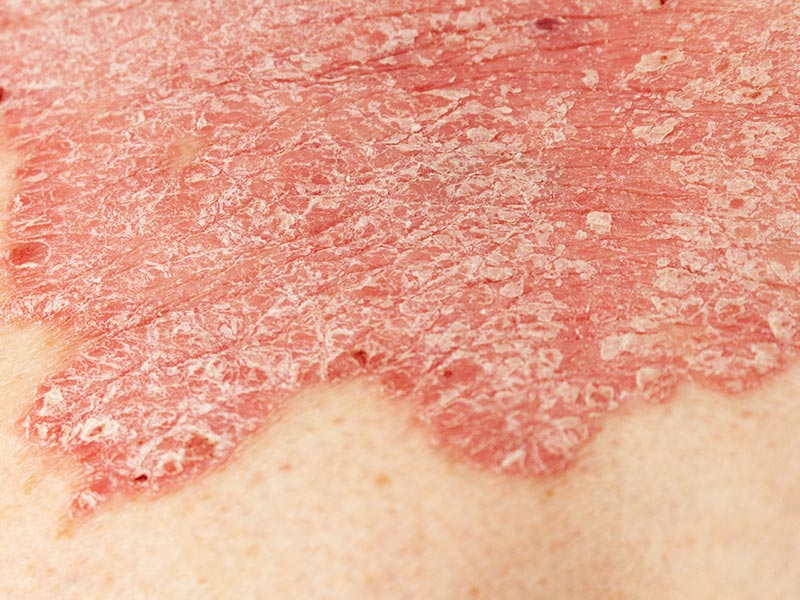
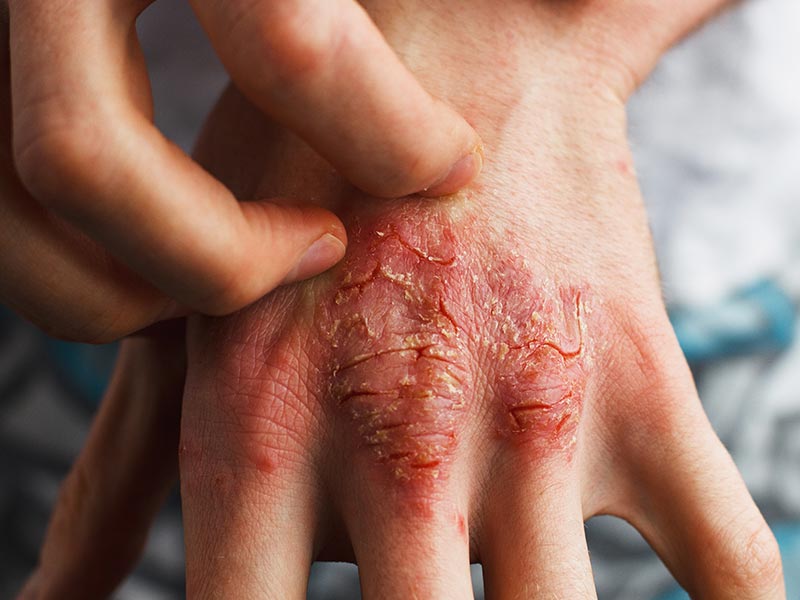
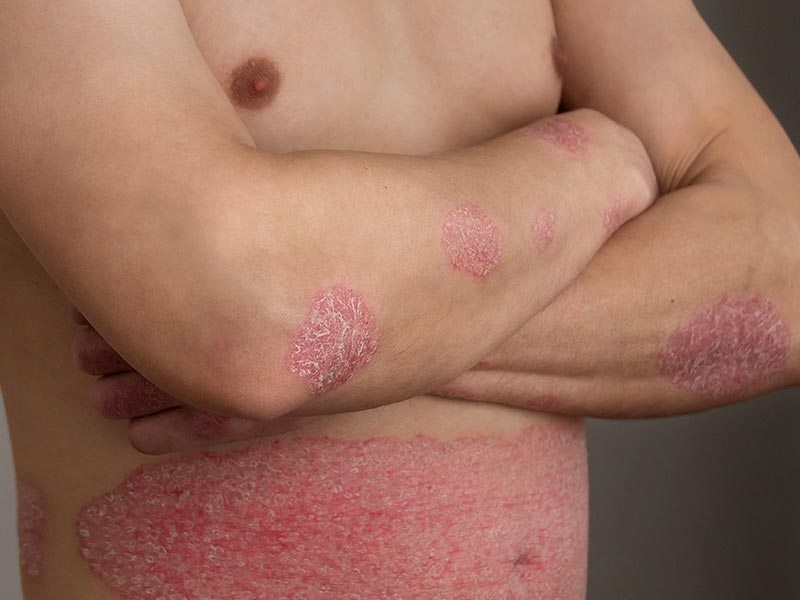
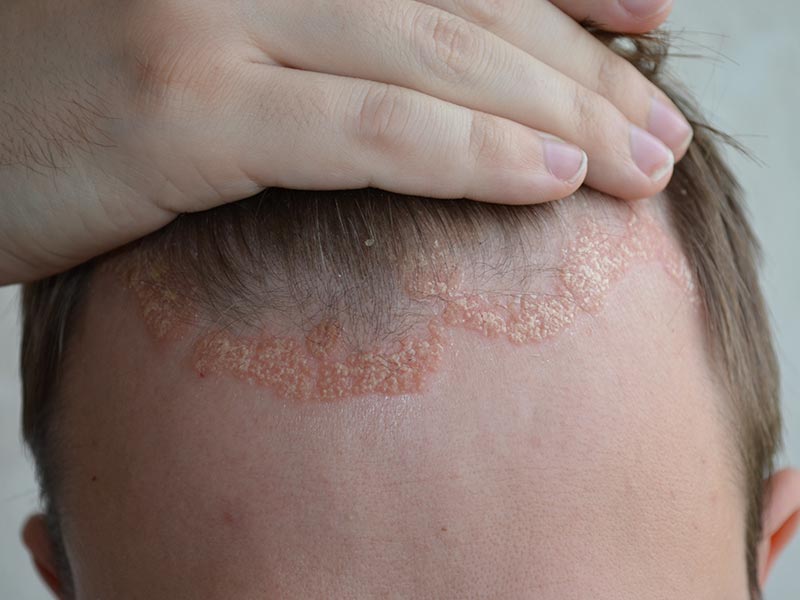
WHAT DOES PSORIASIS LOOK LIKE?
There are several clinical patterns of psoriasis (see pictures):
Chronic Plaque– The commonest variant, it tends to occur on the extensor aspects of the elbows and knees and in the scalp. Skin changes include pink or red inflamed, thickened plaques with copious white scale (see image).
Sebopsoriasis – similar to scalp psoriasis but can occur on the face, chest, armpits and groin
Flexural – raw, red areas in the groin, armpits or under the breasts
Guttate – multiple small spots of psoriasis that erupt on the trunk following a sore throat or illness (see image).
Erythrodermic – extensive disease covering more than 90% of the body surface area.
Palmoplantar pustular – pus-filled inflamed spots and the palms and soles
Pustular – the most severe form of psoriasis, skin lesions are red, tender and filled with pus spots
Psoriasis can vary in severity from no more than a minor irritation to being a major problem – in extreme cases, sometimes requiring hospitalisation. Even a small bit of psoriasis in a delicate area such as the face or genitals can cause immense distress. Occasionally it can be itchy or cause painful splitting or fissuring of the skin. As well as the skin being affected, the nails can become abnormally brittle with flaking and pitting. 5% of patients might develop arthritis associated with psoriasis.
HOW CAN PSORIASIS BE TREATED?
The treatment of psoriasis can be divided into three basic strategies depending on severity, namely creams, phototherapy (ultraviolet/sunlight) or systemic medication (oral or injectable drugs).
Creams include emollients, soap substitutes, vitamin D, tar, steroids.
Phototherapy involves precise doses of ultraviolet light being delivered by a medical UV-machine. Phototherapy involves precise doses of ultraviolet light being delivered by a medical UVA/UVB machine. Our expert dermatology nurses and physicians assistant run the phototherapy clinic. Sessions may be 2 or 3 times weekly depending on the type of ultraviolet therapy required and the cost is £60 for admission and then £50 for subsequent sessions when purchased in a package. See link below for more information.
Phototherapy Service
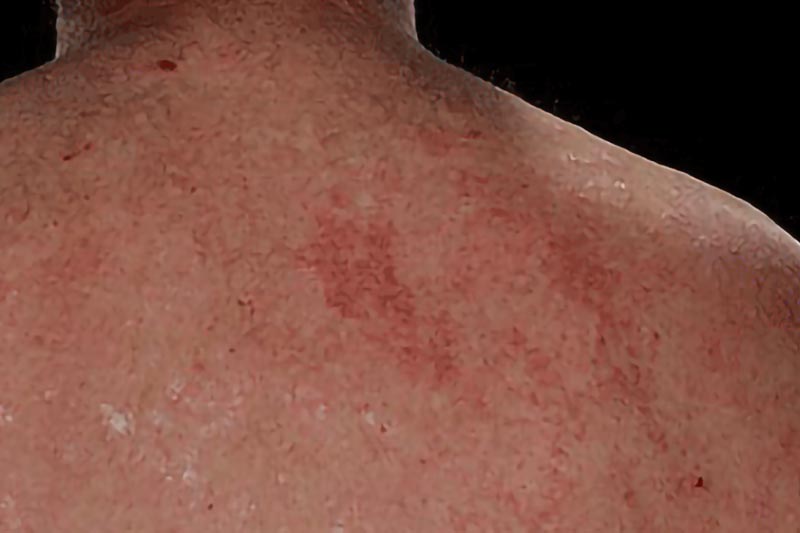
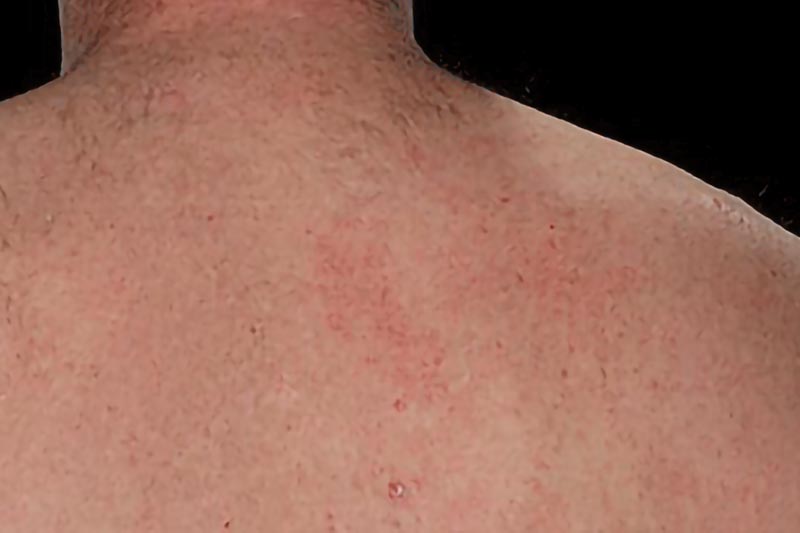
Systemic medications include tablets such as acitretin, methotrexate and ciclosporin or injectables such as etanercept, adalimumab or ustekinemab. These powerful drugs are reserved for severe or life-limiting psoriasis. (For more information on psoriasis, please see the British Association of Dermatologists website treatment for moderate or severe psoriasis advice leaflet).
Remember, although psoriasis is incurable, it can be well controlled with medication. There is no need to let psoriasis rule your life.
For more information on psoriasis, please see the British Association of Dermatologists website psoriasis advice leaflet.
FREQUENTLY ASKED QUESTIONS
Is psoriasis genetic?
Psoriasis can run in families so if you have a close family member who suffers from the condition then you are more likely to have it too. The exact role genetics play in psoriasis is unclear.
What can trigger psoriasis?
Common psoriasis triggers include:
- an injury to the skin
- alcohol
- smoking
- stress
- puberty
- menopause
- immune disorders
- certain medications
Is psoriasis contagious?
No, psoriasis is not contagious
What is it like to have psoriasis?
Psoriasis can vary in severity from no more than a minor irritation to being a major problem – in extreme cases, sometimes requiring hospitalisation. Even a small bit of psoriasis in a delicate area such as the face or genitals can cause immense distress. Occasionally it can be itchy or cause painful splitting or fissuring of the skin. As well as the skin being affected, the nails can become abnormally brittle with flaking and pitting. 5% of patients might develop arthritis associated with psoriasis. Although psoriasis is incurable, it can be well controlled with medication.
What advice can you give for living with psoriasis?
In addition to receiving specific treatment for psoriasis flare-ups, it’s also important that you self-manage your skin condition in order to minimise and prevent flare-ups from happening. Maintaining good physical and mental health will ensure that your immune system is strong and will lessen the risk of joint pain and fatigue that can be associated with psoriasis. Stress is often a trigger for flare-ups of psoriasis and other skin conditions, so beneficial for your health if you can avoid stress as much as possible.
If you’d like to find out more about how we can help you to manage your psoriasis effectively in the long term, please contact us and we’ll arrange a consultation with one of our dermatology specialists.
WHY CHOOSE THE HARLEY STREET DERMATOLGY CLINIC?
Having the right dermatologist is important especially when you have a chronic skin condition that will require ongoing treatment. We want you to feel confident that we’re providing you with the best possible care. We also want you to feel as comfortable as possible with your dermatologist.
The Harley Street Dermatology Clinic specialises in conditions affecting the skin, hair and nails. Our goal is to provide all the care that you need when you’re experiencing these kinds of problems. We want to make it easy for you to access the best quality treatment and support in London.
The clinic is conveniently located in Central London, so it’s easy to visit us if you need to see a dermatologist. You will find yourself in a very comfortable and welcoming environment. We have created a relaxing space where you will receive the highest quality of care. We are regulated by the Care Quality Commission, are part of the British Association of Dermatologists and are top rated by patients of Doctify so you can be sure of safe and effective treatment with us.
CONTACT US
Finding Us
The Harley Street Dermatology Clinic
35 Devonshire Place
London
W1G 6JP
The clinic can be accessed by public transport, on foot or by car. There is paid on street parking around the Harley Street district. The nearest tube stations are Regent’s Park and Baker Street, and Marylebone train station is a 15 minute walk away.
Contact Details
Opening Hours
While appointments can be made available outside usual hours in special circumstances, our core hours are:
Monday: 8am - 6pm
Tuesday: 8am - 6pm
Wednesday: 8am - 6pm
Thursday: 8am - 6pm
Friday: 8am - 6pm
Saturday : 10am - 2pm
Sunday: Closed
REQUEST A CALL BACK
Please fill in this form and one of our team will give you a call back to arrange a consultation with one of our expert dermatologists.
